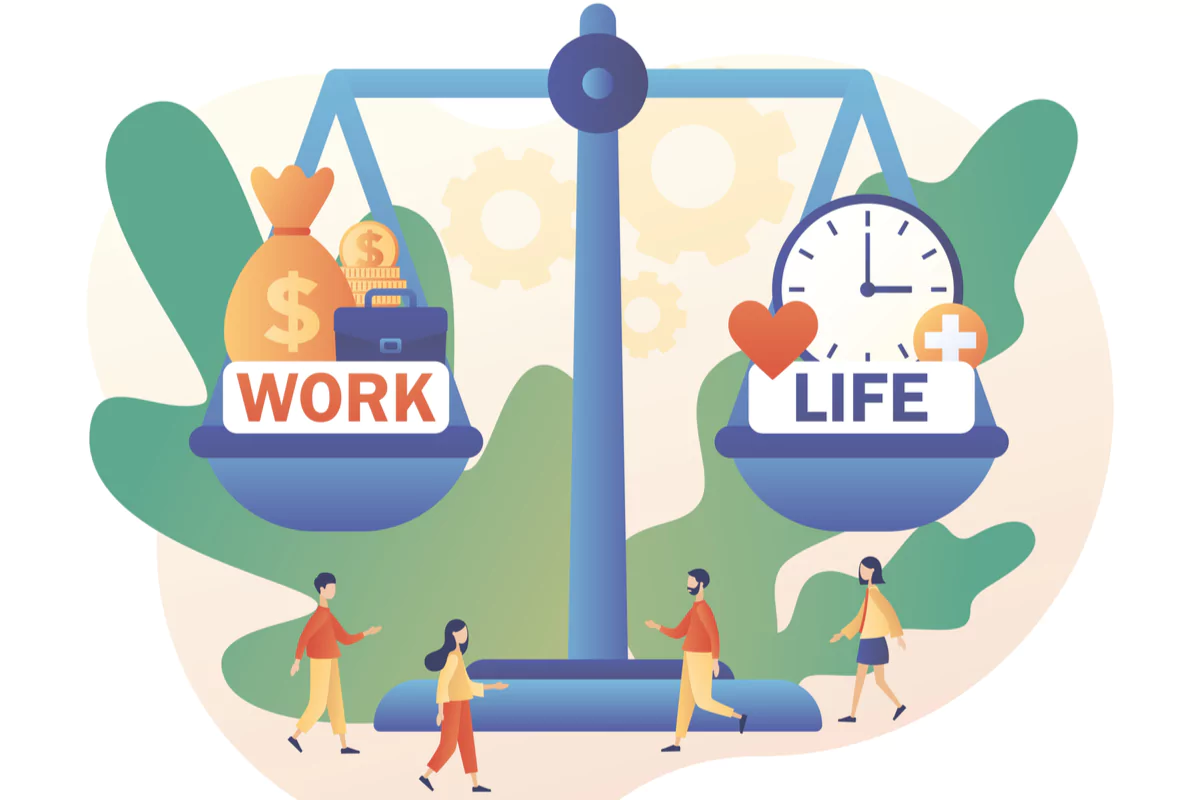In today’s fast-paced and demanding world, achieving work-life balance has become an increasingly important goal for individuals seeking to lead fulfilling and meaningful lives. Work-life balance refers to the equilibrium between professional responsibilities and personal well-being, encompassing various aspects such as career, family, health, and leisure. In this article, we will explore the significance of work-life balance, the challenges it presents, and practical strategies for attaining harmony in our daily lives.
Are you ready to pitch your content on the Indian Blog? Submit your guest post here.
What is Work-Life Balance?
Work-life balance is the state of equilibrium where a person equally prioritizes the demands of one’s career and the demands of one’s personal life. It is important to have a good work-life balance because it can lead to a number of benefits, such as:
- Reduced stress: When you have a good work-life balance, you are less likely to feel stressed about work. This is because you have time to relax and recharge, which helps you to cope with the demands of your job.
- Improved productivity: When you are less stressed, you are more likely to be productive at work. This is because you are able to focus on your work and you are not as likely to make mistakes.
- Increased happiness: When you have a good work-life balance, you are more likely to be happy. This is because you have time to do the things that you enjoy, which helps you to feel fulfilled.
Work-life balance is more than simply dividing time between work and personal activities. It is about finding harmony and alignment between different domains of life, ensuring that no single aspect dominates at the expense of others. Striving for work-life balance acknowledges that we are multifaceted individuals with diverse needs and desires and that neglecting one aspect can detrimentally impact our overall well-being.
The Importance of Work-Life Balance
Work-life balance is important for a number of reasons. First, it can help to reduce stress and improve your overall health. Second, it can help you to be more productive at work. Third, it can help you to be happier and more fulfilled in life.
- Physical and Mental Well-being: Maintaining a work-life balance is essential for our physical and mental health. Chronic work-related stress and an imbalance between work and personal life can lead to burnout, fatigue, and a decline in overall well-being. Prioritizing self-care, leisure activities, and quality time with loved ones promotes resilience, reduces stress, and enhances our overall quality of life.
- Enhanced Productivity and Performance: Striking a balance between work and personal life positively impacts our professional performance. When we take time to recharge, engage in hobbies, and nurture relationships, we return to work refreshed, energized, and more focused. By prioritizing our well-being, we improve our productivity, creativity, and problem-solving abilities, leading to greater job satisfaction and success.
Challenges to Achieving Work-Life Balance
- Technological Blurring of Boundaries: Advances in technology have enabled constant connectivity, blurring the boundaries between work and personal life. Emails, instant messages, and remote access to work-related platforms make it challenging to disconnect and recharge. Setting boundaries, establishing digital-free zones, and creating a clear separation between work and personal time are crucial to overcoming this challenge.
- Cultural Expectations and Norms: Societal expectations and workplace cultures can often prioritize long working hours and dedication to one’s career over personal well-being. Breaking away from these norms and advocating for work-life balance may require assertiveness, open communication, and support from both employers and colleagues.
Strategies for Achieving Work-Life Balance
Prioritize and Set Boundaries
It is important to set boundaries between your work life and your personal life. This means not checking work emails or taking work calls outside of work hours. Identify your core values and priorities in life, accordingly allocate time and energy ensuring that both work and personal commitments are adequately addressed. Establish clear boundaries between work and personal life by defining specific hours for work and leisure activities. Communicate these boundaries to colleagues and loved ones to foster respect and understanding.
Practice Self-Care
Prioritize self-care activities that support your physical, mental, and emotional well-being. This can include regular exercise, meditation, adequate sleep, and engaging in activities that bring you joy and relaxation. Nurturing yourself allows you to replenish your energy and maintain resilience in the face of daily challenges.
Delegate and Seek Support
Recognize that you cannot do everything alone. Delegate tasks at work and share responsibilities with family members or trusted individuals in your personal life. Communicate your needs and seek support from your support network, whether it be in the form of childcare, household chores, or emotional support. Collaboration and shared responsibilities can alleviate stress and create space for personal time.
Practice Mindfulness and Time Management
Cultivate mindfulness by being fully present in the moment and focusing on one task at a time. Avoid multitasking, as it can lead to decreased productivity and increased stress. Efficient time management techniques, such as
- Prioritize and Plan: Identify your most important tasks and prioritize them accordingly. Plan your day, week, or month in advance, setting realistic goals and allocating time for both work and personal activities. By having a clear roadmap, you can better manage your time and avoid feeling overwhelmed or scattered.
- Avoid Overcommitment: Overcommitting yourself can lead to excessive stress and a lack of balance, learn to say no when necessary. Assess your capacity and avoid taking on more than you can handle, this will help you to protect your time and energy. Remember, it is okay to decline additional responsibilities or obligations if they interfere with your well-being and work-life balance.
- Take breaks: It is important to take breaks throughout the day, even if it is just for a few minutes. This will help you to stay focused and avoid burnout.
- Delegate tasks: If you are feeling overwhelmed, don’t be afraid to delegate tasks to others. This will free up your time so that you can focus on the things that are most important to you.
- Make time for yourself: It is important to make time for the things that you enjoy, whether it is spending time with family and friends, pursuing hobbies, or simply relaxing.
Establish Supportive Relationships
Foster positive relationships both at work and in your personal life. Surround yourself with individuals who understand and respect your commitment to work-life balance. Seek mentors or colleagues who can provide guidance and support in navigating the challenges of balancing professional and personal responsibilities.
Unplug and Disconnect
Set aside designated times to disconnect from technology and work-related obligations. Establish “tech-free” zones or hours during which you can focus on personal activities, hobbies, or quality time with loved ones. Disconnecting from work allows you to recharge, be fully present, and engage in activities that bring you joy and fulfillment.
Continuous Evaluation and Adaptation
Work-life balance is a dynamic process that requires regular evaluation and adjustment. Reflect on your current routines and strategies periodically to assess their effectiveness. Be open to adapting and experimenting with new approaches that align better with your evolving needs and circumstances.
Few additional tips for achieving work-life balance
- Be proactive: Don’t wait for your work-life balance to get out of control. Start by setting boundaries and making time for the things that are important to you.
- Be flexible: Things don’t always go according to plan, so be prepared to be flexible with your schedule. If something unexpected comes up, don’t be afraid to say no to extra work or commitments.
- Communicate with your employer: If you are struggling to achieve a work-life balance, talk to your employer. They may be able to offer you flexible work arrangements or other solutions that can help you find a better balance.
Achieving a work-life balance is not always easy, but it is worth it. By following these tips, you can improve your overall health and happiness.
Conclusion
Achieving work-life balance is a continuous journey that requires intentional effort, self-awareness, and proactive decision-making. By acknowledging the importance of maintaining harmony between work and personal life, individuals can enhance their overall well-being, satisfaction, and productivity. Work-life balance is important for your physical, mental, and emotional health. By following the tips above, you can achieve a better work-life balance and live a happier and more fulfilling life.
Remember that work-life balance is subjective and unique to each individual. It is not about achieving perfect symmetry, but rather about finding a personalized equilibrium that allows you to thrive in all aspects of your life. Embrace the process of self-discovery, self-care, and mindful time management, and strive to create a life that honors both your professional aspirations and your personal happiness. With commitment and conscious choices, you can create a fulfilling and balanced life that nourishes your mind, body, and soul.


